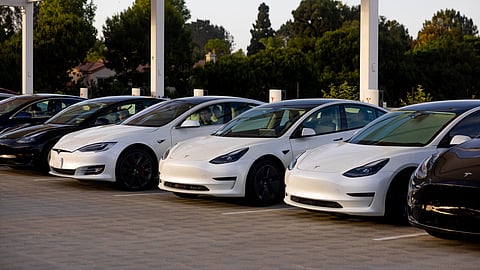California Rebate Checks Fuel the Rise of Electric Cars in LA
In the green wave sweeping the automotive world, electric cars have taken center stage, fueled in part by California rebate program. From Elon Musk's Tesla empire to Porsche's luxury electric models, the industry is accelerating towards a cleaner future in Los Angeles. In this city, cars are more than just a mode of transportation – they're a way of life. But as California reevaluates its popular electric-car rebate program, the question arises: Who is being left behind in this electric revolution?
The National Drive: Tesla to Porsche
Tesla and Porsche have become the beacons of electric vehicle (EV) innovation. Tesla's offerings have made electric cars not only viable but also desirable, with high performance and cutting-edge tech features. Porsche's Taycan series, on the other hand, proves that luxury and sustainability can indeed go hand in hand.
While federal policies have incentivized EV adoption through tax breaks, the real change has been brought about by consumer perception. Once considered quirky and impractical, electric cars have now entered mainstream awareness, making the transition from novelty to necessity.
Porsche's Portfolio: From 944 to Cayman
The journey of Porsche in the realm of electric vehicles has been captivating. While the company is renowned for its classic models like the Porsche 944, a gas-powered icon from the '80s, it has also embraced the future with open arms. Enter the Porsche Cayman, a model that could very well see an electric variant in the coming years. As Porsche continues to electrify its lineup, from the Taycan to potential Cayman models, it's clear that the brand wants a stake in the future of sustainable cars.
When we talk about electric cars for sale, it's not just Tesla and Porsche filling the slots. Companies like Honda and Kia have also stepped into the arena. The Honda electric car lineup aims to blend reliability with eco-consciousness, whereas the Kia electric car models focus on delivering both affordability and range. With more options available, electric vehicles are no longer just a dream for the average consumer but a very attainable reality.
The LA Charge: A City Plugged In
Los Angeles, with its maze of freeways and endless traffic, has emerged as a hotspot for electric vehicles. The city government's initiatives aim for a majority of car trips to be in electric vehicles by 2028. However, this transition also shines a light on the broader economic landscape.
The Rebate Reversal: California's New Focus
In a significant policy shift, California is phasing out its popular Clean Vehicle Rebate Project to focus on subsidies for low- to middle-income residents. The new program, Clean Cars 4 All, will provide subsidies for families earning up to $90,000 a year, a stark contrast to the previous cut-off at $200,000 for joint filers. This comes as California sets an ambitious mandate that 35% of all new cars sold by 2026 should be zero-emissions, eventually rising to 100% by 2035.
But the change is not without controversy. Car dealers have expressed concern that this new income-focused structure may discourage middle- to high-income families from transitioning to electric vehicles. The average cost of an electric car is still around $53,469, considerably more expensive than other options on the market. Some argue that California rebate checks have played a pivotal role in promoting electric vehicle adoption. The state is making a concerted effort to encourage residents from all income brackets to make the switch, and this becomes particularly significant given the controversies around the phasing out of the Clean Vehicle Rebate Project.
Bridging the Gap: LA's Role
While the state's policy adjustments aim to democratize access to electric vehicles, there are concerns about whether this will create a gap among consumers.
Los Angeles, with its mix of affluence and economic challenges, could serve as the litmus test for this new approach. Will the city's celebrities and influencers, often seen driving Teslas, be able to inspire wider adoption among all income groups? Or will the wealthy continue to use electric cars as status symbols, while those with fewer financial resources have to rely on public transportation and older, less efficient vehicles?
Conclusion: The Road Ahead
The rise of electric cars has shifted from a question of 'if' to 'when,' and Los Angeles is positioned to be at the forefront of this change. As the city races towards a cleaner, greener future, it also faces the challenge of making this transformation inclusive. The changes in California's rebate programs indicate a shift toward greater equity, but we still need to determine whether this will speed up or slow down LA's journey toward sustainable luxury on wheels.
Los Angeles stands at a crossroads – navigating between sustainability and luxury, policy and culture, high-end models and affordable options. Whether it's Porsche's potential electric Cayman or Honda's practical electric alternatives, the market is diversifying. The inclusion of programs like Clean Cars 4 All and the glamor added by celebrities like Elon Musk have made electric vehicles more than just a trend. They are fast becoming a staple on LA's freeways.
As California rebate program adapt to a changing landscape, the question remains: Will this path lead to a greener, more inclusive future or will the electric car remain an emblem of luxury? Only time will tell.
Exclusive Presentation by Resident Publications.
Inspired by what you read?
Get more stories like this—plus exclusive guides and resident recommendations—delivered to your inbox. Subscribe to our exclusive newsletter
Resident may include affiliate links or sponsored content in our features. These partnerships support our publication and allow us to continue sharing stories and recommendations with our readers.

